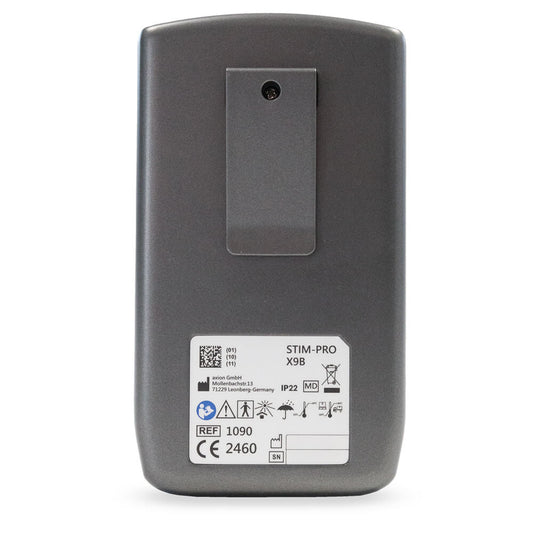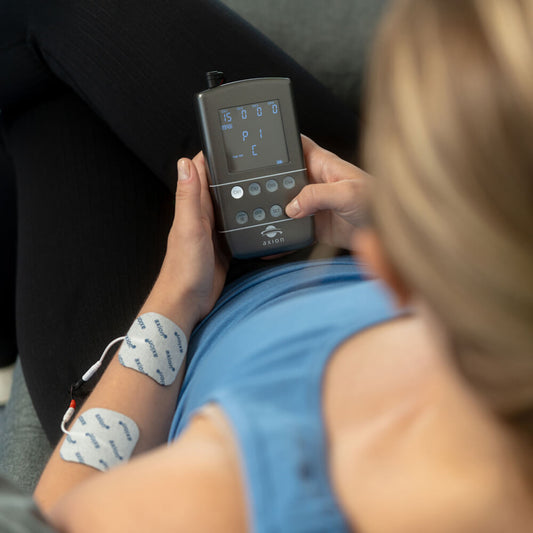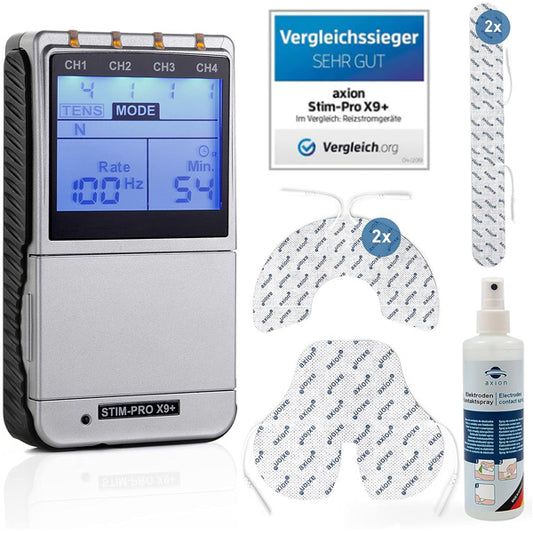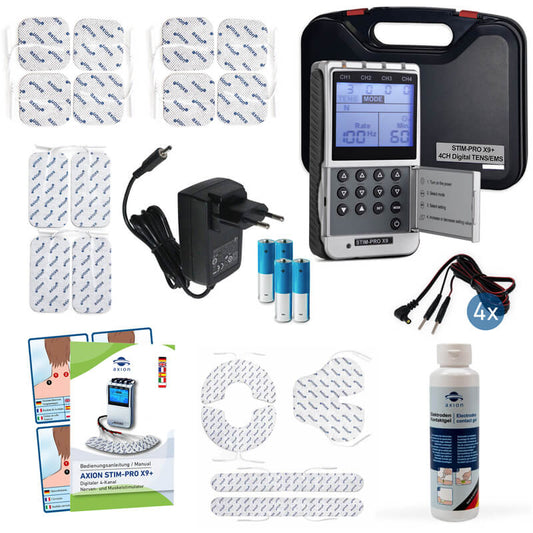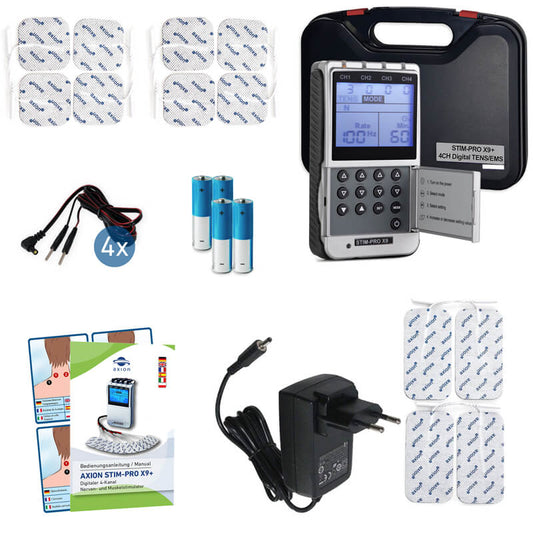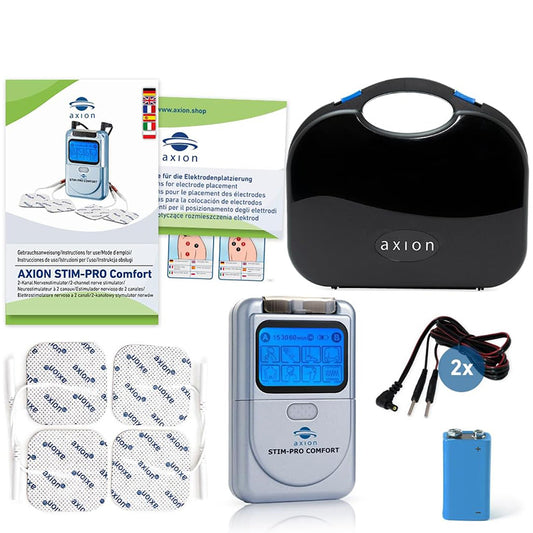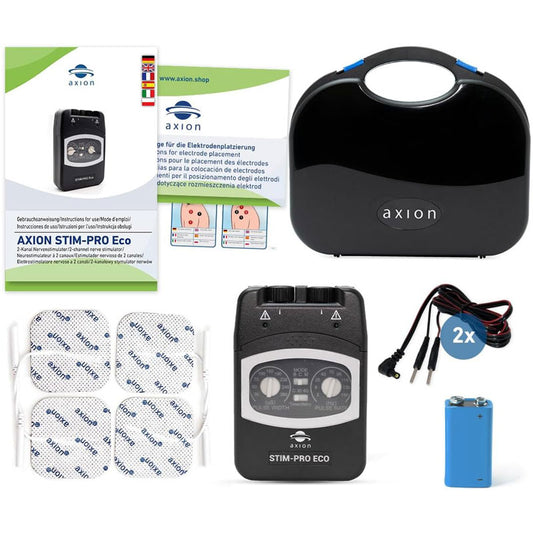TENS machines
Our most popular TENS machines
-
TENS Machine 4-Channel STIM-PRO X9B Combo Set – including Back Electrodes & Contact Spray
Regular price €179,95Regular priceUnit price per -
4 Channel TENS EMS machine STIM-PRO X9B with rechargeable battery and soft case
Regular price €164,95Regular priceUnit price per -
STIM-PRO X9 back bundle including contact spray
Regular price €179,95Regular priceUnit price per -
TENS EMS machine STIM-PRO X9+
Regular price €164,95Regular priceUnit price per -
TENS machine STIM-PRO COMFORT
Regular price €49,95Regular priceUnit price per€0,00Sale price €49,95 -
TENS machine STIM-PRO ECO
Regular price €44,95Regular priceUnit price per
What is a TENS machine?
TENS units come in different shapes and sizes, from small hand-held units for home use to larger tabletop units used in hospitals and physiotherapy practices. They usually have several adjustable parameters that can be used to vary the strength of the stimulation current, the pulse width and the frequency. These settings can be adjusted to achieve maximum pain relief while avoiding possible adverse effects.
For those seeking an alternative form of treatment for their chronic or acute pain without resorting to medication or surgery, TENS units can be an effective option to consider.
Pain relief from TENS is achieved through the following:
-
Block pain transmission to the brain
In the case of illnesses or injuries, we only perceive pain when the corresponding pain signals from the affected area reach the brain.
High-frequency TENS superimposes the pain signals, blocking the transmission to the brain. This in turn leads to the fact that you do not perceive the pain. -
Stimulation of endorphin release
The human body has a natural pain control mechanism. An essential part of this is the release of happiness hormones in the body, which reduce the sensation of pain. These are called endorphins. By using the low frequency "burst" mode of a TENS machine, the body is externally stimulated to release endorphins and thus reduce pain.
What kind of pain does a TENS unit help you with and where do I place the electrodes?
-
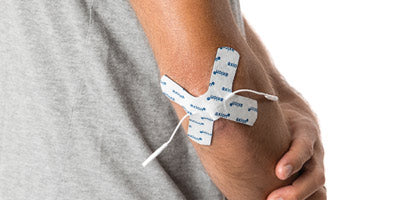 - Arm pain
- Arm pain
- Arthristis
- Arthrosis -
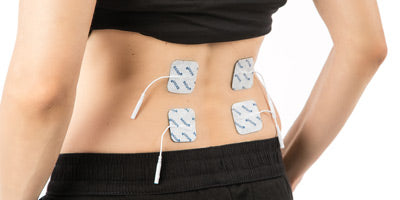
- Golf Arm
- Wrist pain
- Lumbago and sciatica
- Knee pain
- Lumbar spine
- Migraine -
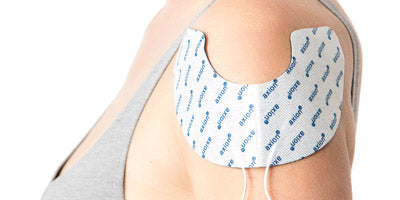
- Neck pain
- Back pain
- Shoulder pain
- Ankle pain
- Tennis Elbow
- Calf pain
Frequently asked questions
FAQ TENS
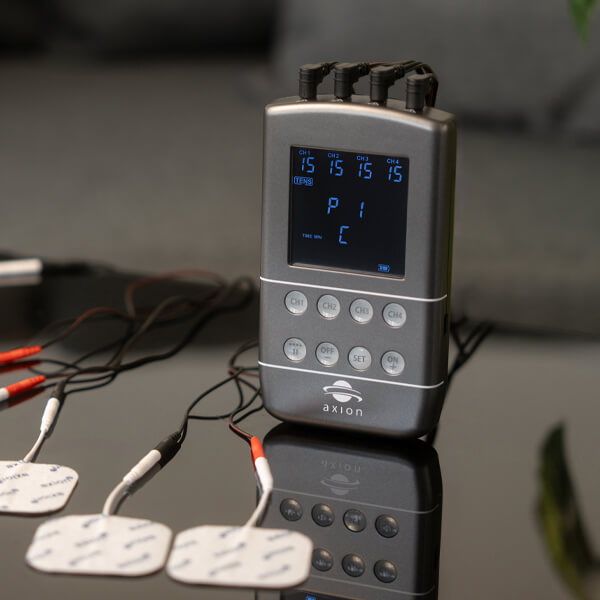
What does TENS mean?
TENS stands for Transcutaneous Electrical Nerve Stimulation.
How does TENS treatment work
You place the adhesive electrodes in such a way that the painful area is delimited. Then you select a pre-installed programme that suits your type of pain or set the parameters manually. Finally, you select the intensity so that you feel a pleasant tingling sensation without pain.
What do I have to consider before using TENS?
In order to optimize the conductivity of the electrodes, you should remove dirt and fat from your skin before using the TENS. Our contact spray is ideal for this.
If you have a lot of hair, we recommend that you shorten or shave your hair completely in the area to be treated.
After use, the electrodes should be stuck back onto the carrier foil and protected from dust or other dirt.
How important are the electrodes for TENS devices?
The electrodes play an important role in TENS pain therapy. Depending on the body region to be treated, electrodes with a special fit are required in order to achieve effective pain treatment.
We at axion have been continuously developing our electrodes for over 10 years in order to make your treatment as effective and comfortable as possible.
Discover our huge range of electrodes, both for axion stimulation current devices and for all other common electrical stimulators. To the electrodes
When should you not use a TENS device?
Even if the TENS treatment is considered to be free of side effects when used correctly, you should not use the TENS nerve stimulation if the following applies to you (or explicitly clarify this with your doctor):
- Heart disease and cardiac arrhythmia
- Pacemaker
- open wounds
- pregnancy
- tumors
- Implants or metals
- Epilepsy
Can I use the TENS electrodes several times?
Yes, our adhesive electrodes have a strong adhesive surface and can therefore be reused.
If the adhesive strength decreases, you can extend the service life with the electrode contact spray or the electrode gel.
Nevertheless, the electrode pads are consumables that must be replaced regularly. With us you will find high-quality electrodes at a price
Does an EMS function make sense?
Yes, because the best way to reduce and prevent pain is to exercise regularly.
With EMS, you can build and strengthen muscles in a targeted manner, which protects you from pain as a preventive measure. EMS training is particularly easy on the joints.
Learn more about the benefits of an EMS device
Does the TENS treatment promote blood circulation?
An increase in skin temperature has been observed during TENS treatment in patients with chronic pain in the extremities. It is therefore assumed that TENS increases blood circulation, leads to a better supply of nutrients and thus accelerates the healing of various types of wounds.
How long does the effect of a TENS treatment last?
The pain-relieving effect of TENS after stimulation can last between five minutes and 18 hours.
Since TENS can release pain-relieving messenger substances, the pain can be suppressed for a longer period of time.
Does a TENS treatment also loosen tense muscles?
According to studies, TENS helps to relieve pain caused by muscle knots, muscle tension, muscle soreness and spasms. Stimulating blood flow can also help you with tense muscles.
Some devices, such as our STIM-PRO X9, have special massage programs that you can use to relax tense muscles and bring soothing relaxation home.
Do you need a prescription for a TENS machine?
We have a wide range of TENS machines that do not require a prescription. You can buy these without a prescription.
In the vast majority of cases, the private purchase of a TENS device is also worthwhile in terms of costs, since it can be used in so many different ways and thus becomes a loyal companion in everyday life.
Are there TENS machine side effects?
The side effects of TENS units for pain therapy are generally mild, even with prolonged use. If any effects are particularly bothersome, a doctor can assess the continued use of transcutaneous electrical nerve stimulation machines. Skin irritation and minor burns are possible side effects. If these occur, stop using the nerve stimulator immediately and consult your doctor.
Who is the TENS machine test winner?
There are several comparison websites that determine a test winner for TENS devices. However, the criteria for assessment are often not transparent, and the individuals testing the nerve stimulation devices usually have limited experience. The success of electrostimulation devices also depends on the condition and individual characteristics of the patient, as well as the intended TENS application. That's why, at Axion, we place a strong emphasis on our customer service to assist you as effectively as possible with any open questions.
Can I use a TENS-unit with metal in the body?
We generally advise against using an electrotherapy device with metal implants unless your doctor has explicitly recommended it.
-

-
We are happy to help
Do you still have questions about TENS devices? Our trained consultants are there for you!
-
Give us a call:
+49 (0) 7152 - 353 911 - 0
Mon-Fri, 09:00 - 17:00
Send us an email:
customerservice@axion.shop
Studies and scientific sources
[1] Marchand, S., Charest, J., Li, J., Chenard, J.-R., Lavignolle, B. & Laurencelle, L. (1993) . Is TENS purely a placebo effect? A controlled study on chronic low back pain. Pain, 54(1), 99-106. https://doi.org/10.1016/0304-3959(93)90104-w
[2] Maayah, M. (2010) . Evaluation of Transcutaneous Electrical Nerve Stimulation as a Treatment of Neck Pain due to Musculoskeletal Disorders. Journal of Clinical Medicine Research, 127-136. https://doi.org/10.4021/jocmr2010.06.370e
[3] Bachmann, J. & Pothmann, R. (2010) . TENS. Transcutaneous electrical nerve stimulation in pain therapy (4th ed.). Karl F. Haug Verlag.
[4] Aiyejusunle, CB, Kola-Korolo, TA & Ajiboye, OA (2007) . Comparison of the effects of tens and sodium salicylate iontophoresis in the management of osteoarthritis of the knee. Nigerian Quarterly Journal of Hospital Medicine, 17(1). https://doi.org/10.4314/nqjhm.v17i1.12539
[5] Allais G, De Lorenzo C, Quirico PE, Lupi G, Airola G, Mana O & Benedetto C (2003) . Non-pharmacological approaches to chronic headaches: Transcutaneous electrical nerve stimulation, laser therapy and acupuncture in transformed migraine treatment. Neurological Sciences, 24(S2), s138-s142. https://doi.org/10.1007/s100720300062
[6] Ortu E, Pietropaoli D, Mazzei G, Cattaneo R, Giannoni M, & Monaco A (2015) . TENS effects on salivary stress markers: A pilot study. International Journal of Immunopathology and Pharmacology, 114-118. https://doi.org/10.1177/0394632015572072




